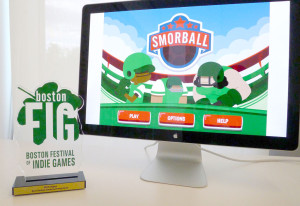We’d love to share our gratitude for all of the good Tiltfactor goings-on with you! There is quite a bit to be thankful for this year.
Awards
This year, to date, Tiltfactor garnered much recognition!
Smorball and its ‘Best Serious Game’ award
- In September, the Tiltfactor team won the “Best Serious Game Award” for our transcription game Smorball at the Boston Festival of Indie Games. Read all about it! Our computers were constantly filled, as players loved the game and fiercely competed to top each others’ high scores! Check out the complete list of awards at the festival.
- MONARCH, the new board game, was an IndieCade Festival Finalist.
- In March, Mary won the Higher Education Video Game Alliance Award for Advancing Theory and Research.
- Monarch was ranked #2 game at the popular Gen Con. See Mary interviewed about the game from the booth! in French, via Ludivox.
- Of course there’s you, the reader of our update. Gracias! Takk! Danke, etc for checking it out!!
New Games
This year we released SIX NEW GAMES!!
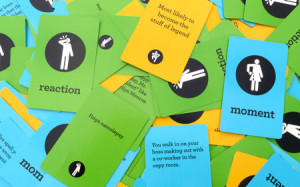
- Gut Check, a card game designed to encourage players to use all of the information available to them when seeking health care. The game aims to illustrate how publicly accessible health pricing and quality data lead to higher quality outcomes at reduced prices. (With Digital Mill and the Robert Wood Johnson Foundation)
- Bill of Health, a board game designed to illustrate the concept of capitated payments for health care in the U.S. health care system, and this payment model’s positive effects on health care quality and costs. (With Digital Mill and the Robert Wood Johnson Foundation)
- Awkward Moment at Work, our card game of awkward work situations is a new game for adults prone to awkwardness. Fun for the whole family and work friends too, with research forthcoming!
- Smorball, a browser game in which players coach their team, the Eugene Melonballers, to victory in the International Smorball Federation all the while transcribing books for the Biodiversity Heritage Library.
- Beanstalk, zen-like a browser game in which players type words both to grow their beanstalks and to transcribe books for the Biodiversity Heritage Library
- MONARCH, the board game where you play as sisters vying for the crown. Technically Monarch is not a Tiltfactor game, but many Tiltfactorites were involved. It’s the hit of the season (along with Buffalo, Awkward Moment, and Awkward Moment at Work!)
For being able to be so productive, we must say arigato to the Universe!
Other News
Geoff Kaufman, our good friend and astute collaborator, was recruited away to become an Assistant Professor in the HCI Institute, Carnegie Mellon. Mazel tov!
We launched the CrowdConsortium.org, and co-organized and launched “Engaging the Public: Best Practices for Crowdsourcing Across the Disciplines,” supported by two government agencies (IMLS and NEH), one private foundation (Sloan), and co-organized by Andrea Wiggins and Neil Fraistat of the U of Maryland. The event, also known as #CrowdCon, was documented in massively detailed, freely available proceedings.
Julia Weber made a video impression of life in the lab this year too. Check it out:
Tiltfactor – A Video Portrait
Salamat po to everyone!
Research Papers
We published on a bunch of our important study findings – if you haven’t read it yet, we recommend taking a look at “A psychologically “embedded” approach to designing games for prosocial causes.” It contains tons of research on how Buffalo and Awkward Moment fight biases!
Kaufman, G., & Flanagan, M. (2015). “A psychologically “embedded” approach to designing games for prosocial causes.” Cyberpsychology: Journal of Psychosocial Research on Cyberspace, 9(3), article 1. doi: 10.5817/CP2015-3-5
Prosocial games often utilize a direct, explicit approach to engage players with serious real-life scenarios and present information about key societal issues, but this approach may limit a game’s persuasive impact–particularly when the apparent aims of the game trigger players’ psychological defenses or reduce players’ potential engagement. In contrast, the “Embedded Design” approach that we introduce here offers effective, evidence-based strategies for delivering persuasive content. This paper provides an in-depth exploration of two key Embedded Design strategies: (1) intermixing: combining “on-topic” and “off-topic” game content in order to make the focal message or theme less obvious and more accessible and (2) obfuscating: using game genres or framing devices that direct players’ attention or expectations away from the game’s true aims.
Kaufman, G., Flanagan, M., and Seidman, M. (2015). Creating Stealth Game Interventions for Attitude and Behavior Change: An “Embedded Design” Model” Digital Games Research Association 2015, Lunenberg Germany
Persuasive games tackling serious issues in a literal, explicit fashion are far less likely to succeed in changing attitudes or behaviors than are games that take the more “stealthy” approach of embedding persuasive messages within a game’s content or context. The “Embedded Design” model, developed by the design and research team at Tiltfactor Laboratory at Dartmouth College, offers novel, evidence-based strategies for including persuasive content in a game in ways that circumvent players’ psychological defenses, trigger a more receptive mindset for internalizing a game’s intended message, and do so without sacrificing players’ enjoyment or the game’s inherent replayability. Such techniques promise to revolutionize the repertoire of techniques that game developers should consider in broaching and presenting serious topics in games. Three original “Embedded Design” strategies are presented in this paper.
Kaufman G., Flanagan M., Seidman M., and Wien, S. “‘RePlay Health’: An Experiential Role-Playing Sport for Modeling Healthcare Decisions, Policies, and Outcomes.” Games for Health Journal, 4(4), 2015. doi:10.1089/g4h.2014.0134.
This article presents the empirical investigation of a novel role-playing sport, the “RePlay Health” game (www.replayhealth.com/), which was inspired by computer simulation of healthcare dynamics. The game immerses players in a fictional world in which they take on the role of characters who are prone to behavioral and environmental risk factors. In a randomized experiment testing the efficacy of the game, active players (as compared with spectators) reported significantly higher scores in subjective ranking of several health policies modeled by the game. After gameplay, players were also significantly more likely to understand health systemically by identifying environmental and systemic factors in health problems. See more http://www.tiltfarg/role-playing-game-to-change-ideas-on-public-health/.
Manzo, C., Kaufman, G., Punjasthitkul, S., & Flanagan, M. “‘By the People, For the People’: Assessing the Value of Crowdsourced, User-Generated Metadata.” Digital Humanities Quarterly, 9(1), 2015.
With the growing volume of user-generated classification systems arising from media tagging-based platforms (such as Flickr and Tumblr) and the advent of new crowdsourcing platforms for cultural heritage collections, determining the value and usability of crowdsourced, “folksonomic,” or user-generated, keywords for libraries, museums and other cultural heritage organizations becomes increasingly essential. This study builds on prior work investigating the value and accuracy of folksonomies. Analysis showed that 88% of participant-provided tags were judged to be accurate, and that both tagging patterns and accuracy levels did not significantly differ between groups of professional librarians and non-library participants. These findings illustrate the value of folksonomies for enhancing “findability,” or the ease with which a patron can access materials, and could significantly impact the way libraries and other cultural heritage organizations conceptualize the tasks of searching and classification.
Press
With the release of Monarch and our new paper on Buffalo and Awkward Moment, there have been a ton of articles about the work!
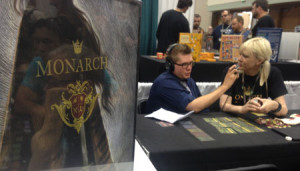
Stoelker, Tom. “Building Bridges Between Tech and the Humanities.” Fordham News, 8 May 2015.
Staff, “Best Games to play This Thanksgiving,” Ars Technica, 21 Nov 2015
Francis, Bryant. “How Monarch redefines what winning means in strategy games.”Gamasutra.
Gan, Vicky. “The Anti-Stereotype Party Game,” The Atlantic CITYLAB, 27 October 2015,
Wilson, Mark. “A Simple Card Game Designed To Rewrite Gender And Racial Stereotypes: The Neatest Thing? It’s Been Proven to Work.” Fast Company, 28 Oct 2015.
Shapiro, Lila. “This Game Can Make People Less Prejudiced. Here’s How.” The Huffington Post, 28 October 2015.
Nauert, Rick. “Right Games Can Reduce Stereotypes & Social Bias,” Psych Central, 27 October 2015
Clark Flory, Tracy. “Sexist Stereotypes Defied With Smart Game Design, Study Shows.” Vocative. 26 October 2015,
Кузнецов, Даниил. “Игры признали эффективным,” N + 1, 26 Oct 2015,
Smith, Steve. “Dartmouth College Researchers Say Newly Designed Game Will Reduce Social Bias And Spread Diversity.” Medical Daily, 27 Oct 2015
Medical Press, “Study illustrates how game design can reduce stereotypes and social biases.” 26 Oct 2015
For more press coverage from the year, visit https://tiltfactor.org/press/. You’ll love it. Asante!
In Development
We have several projects going on in the lab, including using games and interactive narratives to improve the STEM climate for women in University settings with collaborators Geoff Kaufman at CMU and Melanie Green University at Buffalo; sexual assault bystander intervention games with collaborators at UNH. We also have several papers coming out about digital reading vs analog reading, controversial games, and more. Stay tuned. We give a big spasibo to the students working on our current projects!
A Simple Request
As we celebrate the end of a great 2015, we have one request. Research shows that being grateful isn’t just a feel good emotion. Being grateful actually fends off anxiety and stress! So help us and help yourself by writing a review of one of our games, sharing our research, or telling someone who might not have heard of Tiltfactor about our work. Like us on Facebook. Say hi on Twitter.
We’d love to hear from you. Sukria!
Close
Our team has a lot to be thankful for! We’ve been able to do good in the world and involve amazing people along the way. We have special thanks for our 2015 students, who have contributed so much to many many aspects of the lab’s research– from data collection to story writing, from prototypes to videos and beyond. Merci!
Toda, wado, miigwech, pilamaya ye’, and thanks to all!
~The Tiltfactor Team
…and if you, like us, are geeking out on Thanking, check out this nice piece on NPR about gratitude and heart health— amazing research linking the body and the state of our minds.
Our Friends
A final ‘thank you’ to all current interns, staff, and friends for 2015! 谢谢 Xie Xie!
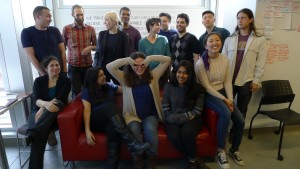
Core Team and Projects Team 2015
Mary Flanagan
Danielle Taylor
Max Seidman
Sukie Punjasthitkul
Farooq Ahmed
Amanda McCormick
Naomi Clark
Sarah Ettinger
Jennifer Estaris
Edward del Rosario
Geoff Kaufman
Kate Adams
Matt Catlow
Our Collaborators, Connectors, and Funders!
Toni Pizza
Melanie Green
Sharyn Potter
Jane Stapleton
Ross Virginia
Ben Sawyer
Trevor Owens
Brett Bobley
Perry Collins
Andrea Wiggins
Neil Fraistat
Claire Knowles
Manish Mishra
Paul Barr
Scott Renton
Gavin Willshaw
Trish Rose-Sandler
William Ulate
Mike Lichtenberg
If we failed to name you specifically in this missive, we hope you know that you have our gratitude.

Play Digital Games
Want to play some games now? Head over to the Tiltfactor site and play games like Smorball!
Our Awesome Student Team
Shivang Sethi (Presidential Scholar)
Luisa Vasquez (WISP+beyond)
Savannah Liu (WISP+beyond)
Jordan Hall
Nikita Shaiva
Shelley Garg
Felicia Teter
Jenny Yeoh-Wang
Jesus Moreno
Simone Wien
Sara Holston
Emma Marsano (WISP)
Julia Weber
Marco Barragan
John Montgomery
Eun “Jinny” Seo
Royce Park
Partners, Liaisons, and Supporters:
The Good Toy Group
UncommonGoods.com
Amazon.com
Pub Services Inc
ACD Distribution
Montshire Museum
Kickstarter friends
The Uncommons
IndieCade
Black Moon Games
Lebanon Salt Hill
Dartmouth Office of Institutional Diversity and Equity
Marbles the Brain Store
Dora Maar Foundation
The Sloan Foundation
The IMLS
The NEH
The NSF
The NIJ
Special thanks also to Dartmouth College in general, and specifically: Amy Olson and the Office of Communications, The Neukom Institute, and the Dean’s Innovation Fund.
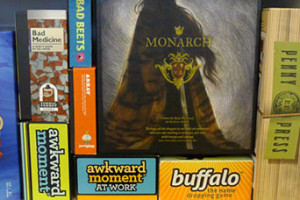
Get Tabletop Games
Looking for a good gift for family that will reduce their biases? Or are you just itching to play MONARCH? Find the games on Amazon.com!


